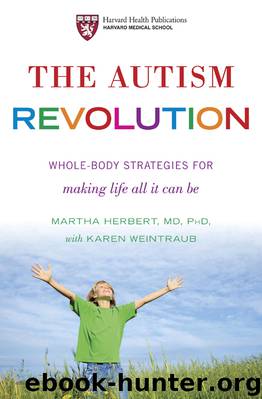The Autism Revolution by Dr. Martha Herbert

Author:Dr. Martha Herbert [Herbert, Martha]
Language: eng
Format: epub
ISBN: 978-0-345-52721-9
Publisher: Random House Publishing Group
Published: 2012-03-26T16:00:00+00:00
Suggestions for a Decent Night’s Sleep
There are lots of basic steps for improving sleep. (These are easily found on the Internet by searching for “sleep hygiene.”) They include things like: have a regular bedtime routine, limit napping, avoid drinking too much liquid after dinner, don’t eat or exercise too close to bedtime, stay away from caffeinated and sugary beverages, avoid foods and drinks with aspartame (Equal or NutraSweet), which can be overstimulating. Limit distractions in the bedroom or sleeping area, turn off or unplug electrical equipment, and block out sources of light.
Getting regular exercise every day is also important for promoting sleep—the U.S. government recommends that children get 60 minutes of exercise a day.
For kids with autism it’s also important to rule out painful digestive problems that might be interfering with sleep, such as reflux, where stomach acid comes back up the throat. Also look for other sources of pain—teeth, bones, cuts, abscesses, splinters—that your child may not tell you about.
Allergies—both food and environmental—can also interfere with sleep. Some allergies can cause hyperactivity, pain, or even bedwetting. (Many people find the same thing with food dyes.) Anyone who suffers from hay fever understands the link between allergies and sleep. Some parents discover that when they eliminate a food allergen such as corn, sleep problems seem to get much milder and bedwetting may go away.
As a toddler, Jimmy was spitting up all the time; he also had terrible diarrhea and flushed cheeks. His doctor said these were all normal, but they went away when Cindy switched his milk to soy. She later confirmed that he was allergic to milk—and, it turned out, to soy as well. His sleep and behavior improved dramatically when she took these foods out of his diet.
Toxins may contribute to hyperactivity, or to grogginess. Try to track your child’s exposures in relation to behaviors and sleep.
A warm Epsom salt bath before bed helps many children sleep. The magnesium in Epsom salts is a natural tranquilizer, and sulfate can help reduce stress on your child’s cellular chemistry. You can make this a part of your bedtime routine.
Melatonin, the hormone that triggers the sleep cycle in all of us, helps many children go to sleep or go back to sleep. It can be given as drops under the tongue or as pills. There is a fair amount of research on melatonin, much supporting its effectiveness, as well as research demonstrating genetic glitches in melatonin pathways in autism.
Sensory integration methods can help with sleep.
Night terrors, though terrifying for you, are not harmful to your child, since they are not remembered in the morning (which is why many experts suggest you not mention them to your child). The most important thing you can do is keep your child safe by using gates to restrict stairs and/or doors to the outside in case they sleepwalk, and remove anything fragile or potentially dangerous from the bedroom. You might want to gently wake your child an hour after bedtime with a reassuring hug and kiss—sometimes this can disturb the child’s sleep pattern enough to prevent an attack.
Download
This site does not store any files on its server. We only index and link to content provided by other sites. Please contact the content providers to delete copyright contents if any and email us, we'll remove relevant links or contents immediately.
| Allergies | Asthma |
| Autism & Asperger's Syndrome | Cystic Fibrosis |
| Down Syndrome | Eating Disorders |
| Epilepsy | Learning Disorders |
| Lice | Special Needs Children |
I Capture the Castle by Dodie Smith(2039)
The Heavy by Dara-Lynn Weiss(1811)
Aspergirls by Rudy Simone(1700)
Be Different by John Elder Robison(1650)
Autism's False Prophets by Paul A. Offit(1539)
My Child's Different by Elaine Halligan(1517)
Smart but Scattered—and Stalled by Richard Guare(1501)
101 Tips for the Parents of Boys with Autism by Ken Siri(1495)
Asperger Syndrome (Autism Spectrum Disorder) and Long-Term Relationships by Ashley Stanford(1427)
What's Making Our Children Sick? by Michelle Perro(1416)
ADHD by Mark Selikowitz(1394)
Girlish by Lara Lillibridge(1389)
On Immunity: An Inoculation by Biss Eula(1363)
An Adult with an Autism Diagnosis by Gillan Drew(1355)
Nerdy, Shy, and Socially Inappropriate by Cynthia Kim(1352)
Animal-assisted Interventions for Individuals with Autism by Temple Grandin(1332)
The Cities by K.A Knight(1317)
Sarah's Child (Hqn Romance) by Linda Howard(1314)
Seeing Ezra by Kerry Cohen(1307)
